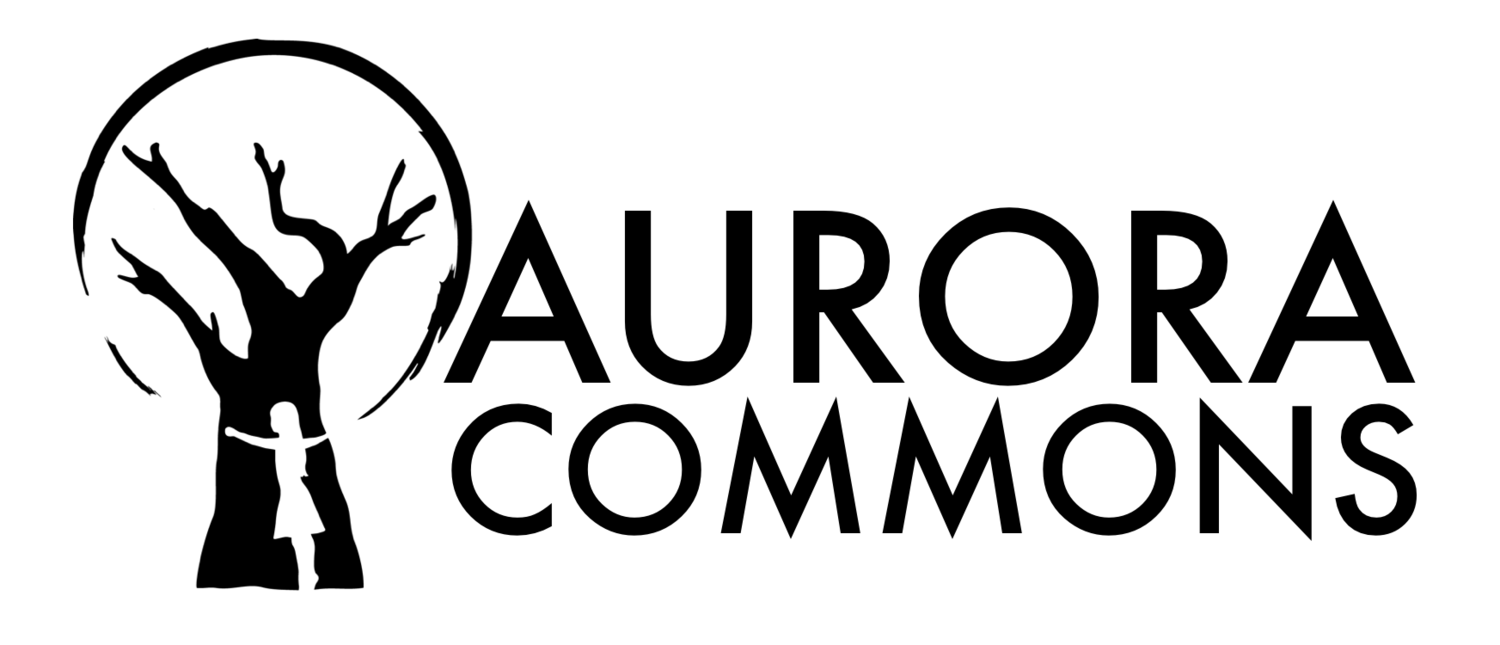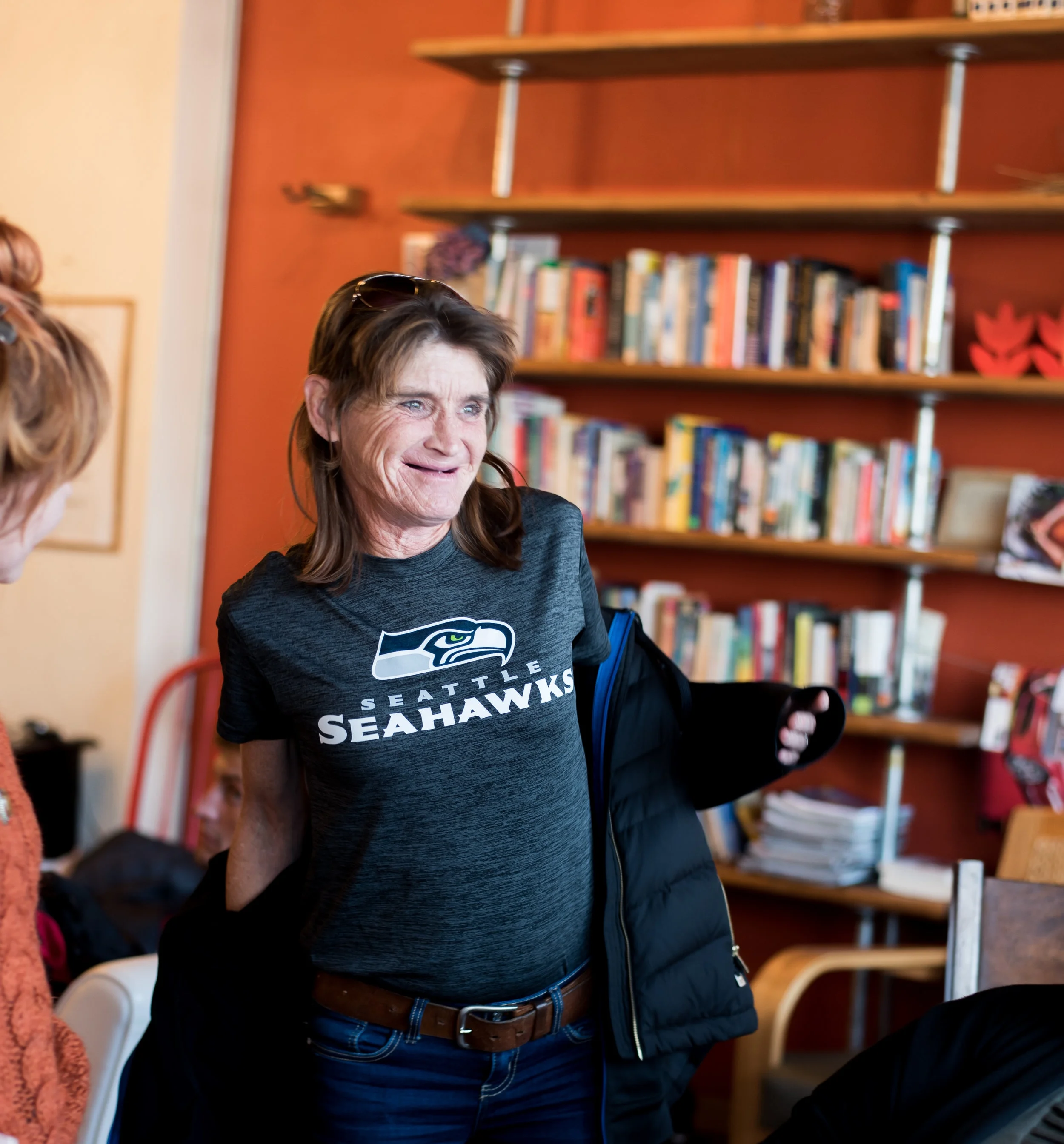“This week at the Aurora Commons I learned I had been wrong about Gratitude all along.”
You can listen to this letter here and if you would prefer to read it, the full text is down below.
“What Myrna teaches us is that you don’t get thankfulness without pain and pain when felt, inevitably and surprisingly always brings us into gratitude. ”
Our dear Myrna
On this day of thanksgiving we often gather, often around food, around the idea of gratitude. Thanksgiving often prompts the question of “what are you thankful for?” Asked over and over this question often feels trite and we can answer it easily without much thought. Being at the Aurora Commons what I learn is that gratitude isn’t a location as much as it is a journey, an arduous one, the journey I most do not want to take, the journey I most need to take, the journey without a destination, the journey which hurts. I learn that gratitude is only learned and not something to be acquired, it’s a moving target, a mystic guide you don’t quite trust, an exacting coach pushing you farther than you physically thought you could go.
Yesterday at the Commons I ask our friend Myrna what she is thankful for. I admit the question is a clique one but she pays that no mind and quickly answers,
“I am thankful for good health and good friends.”
It is the almost banality of her response which catches me, it’s a response one hears all the time, I am thankful for good health and good friends—as if it is only a mere gesture. Our words so often ring hollow. Our words so often are merely glib phrases which underneath ring of a persistent and knocking void. A void which haunts us a bit, climbing up through our words—those vacant building blocks, of “I’m, good, how are you?” — “I’m fine!” — “It’s okay” — “You too” …
Myrna’s response of “I am thankful for good health and good friends” is a common answer this time of year, one many give. We tend to default into essentializing those who lived unhoused by what they do not have, defining them by their lack and thus I expect her answer to be different somehow. I expect somehow for her answer to reveal her pain, her plight, her dire situation, but no, her answer reveals what I might have lost hope in, that maybe we truly still can define community by what we share, by gratitude, by our simple yet profound belief that our humanity in common is enough to bind us together.
“It’s the small blessings you weren’t counting on.” Myrna says and as she says this Don asks her what size she wears,
“Small.” she answers.
“Perfect,” he says as out from behind the bookshelf he pulls a pair of leather slippers he had been saving for her.
“See?” She says to me as she holds out her new slippers. And yes, for a moment I do see.
“I am thankful for good health and good friends”
The boldness of Myrna’s gratitude is shocking, as in knowing her you would know she is on her first day out of respite care after a rocky recovering from lung cancer. “Over ninety-three stitches!” she tells me, 93 stitches to close up her side where she had a lung taken out. Before the lung cancer there was some more cancer, pneumonia, illness upon sickness building and piling up and upon one another. As for friends, she has lost a lot of them lately, with a handful having died in cruel and tragic ways. Without good health and in the midst of the painful loss of some dear friends Myrna looks me in the eyes and steadily and assuredly and non ironically tells me she is “thankful for good health and good friends.”
What Myrna teaches us is that you don’t get thankfulness without pain and pain when felt, inevitably and surprisingly always brings us into gratitude. It is a difficult lesson to learn and a lesson we often spend lifetimes avoiding. When we speak about pain we also are speaking of the ways and tools we use to alleviate our pain, to numb, to ease, to dull the ache. It is a bit more transparent to see how those who are living on the streets and who are living drug dependent are working to numb the overwhelming amount of pain in their lives. For those of us living housed, the ways we numb are sometimes a bit trickier to spot and since the more socially acceptable dependancies we have come alongside some privilege, they can remain quite a bit more camouflaged. But that often hiding vice-like grip on our tools to numb our pain is also the space where our journey through pain and into gratitude and back again begins. We all have our dependancies which numb and sooth that ache and yet as we know when we numb the pain we end up, in happenstance form, numbing thankfulness too. Without this pain we cut off the access route to gratitude, a route which is always in detour, always in flux. Gratitude is an agile climber and we can only and barely try to keep up, but like any good climb it is the work which makes it worth it.
Gratitude follows pain and what Myrna teaches us is the bravery of leading with this gratitude. As she wades through her loss, she allows gratitude to be her guide. Often we experience gratitude only afterwards, but she, well, she leads with it. Without good health and before even receiving a taste of it she states unequivocally that she is grateful for it. Who could have such courage? I tend to only be thankful after I have bargained and worked and pleaded to get what I want and what I most want is often that which will allow me to escape my own pain. Can we be as brave as she, stepping into our pain and allowing it to bring us into the wild country of gratitude? Will we allow our loss and despair to teach us what true thankfulness is? Will we allow the work of gratitude to do its work in us?—the work of revealing to us our pain, pain—which we as a humanity share. This practice of gratitude is disguised within the practice of grief and hunched over our tears, head heavy in our hands, like a steady drumbeat in the distance getting nearer and nearer, approaching the rhythm of our own heartbeat is that wild horse gratitude approaching.
It is a clique Myrna tells me, that question of what are you thankful for, “but it’s a good clique” she says.
“I am thankful for good health and good friends.”
So I ask you now as I asked Myrna, What are you thankful for? How do we reach past the glibness into the real meat of thankfulness and come back scrubbed raw and open by the pain of gratitude? If you allow yourself, the way Myrna did, to touch that tender spot of your own pain you will find as well that reservoir of gratitude. Will we be brave enough to try? The “what are you thankful for?” question is a lot like the question of “what have you lost?” and we often cannot bear to ask, to look, to peak into those depths. Gratitude is a painful place and real gratitude requires we wrestle with those familiar demons lurking around our corners—the haunting of loss, the pain of love and the burden of hope—all these apparitions of grief. Gratitude, if we can truly get our hands on it, will feel like a tender pain—the kind of pain which allows us to wake up and notice, to notice what is around us and what around us isn’t just us and our own pain—but others and their own unique mix of thankfulness and loss—and this is the gift, so bite into it, hold onto it—like a bullet in the teeth, like a leather belt you bite onto to withstand the pain—for this is what gratitude is. If we are able to follow gratitude up that mountain of pain we might have the gift of seeing Myrna up there, just ahead of us, turning back and smiling, leading the way, all the while telling us how thankful she is for her good health and her good friends.
So today, on this sweet day, wherever you may be and whatever you have lost and whatever you may receive today, I wish for you, good health and good friends.


